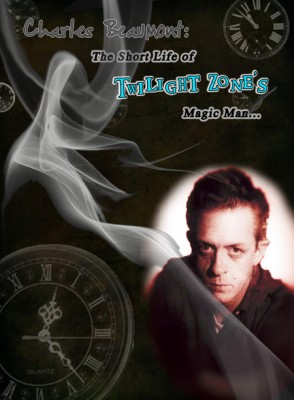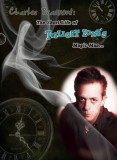| Reviews & Columns |
|
Reviews DVD TV on DVD Blu-ray 4K UHD International DVDs In Theaters Reviews by Studio Video Games Features Collector Series DVDs Easter Egg Database Interviews DVD Talk Radio Feature Articles Columns Anime Talk DVD Savant Horror DVDs The M.O.D. Squad Art House HD Talk Silent DVD
|
DVD Talk Forum |
|
|
| Resources |
|
DVD Price Search Customer Service #'s RCE Info Links |
|
Columns
|
|
|
Charles Beaumont: The Short Life of The Twilight Zone's Magic Man...
Director Jason Brock kindly provided a DVD-R of the film for the purposes of this review.
Charles Beaumont (1929-1967), like Ray Bradbury, is one of a handful of science fiction, fantasy, and horror writers to have enjoyed mainstream acceptance and its benefits; he was for a time one of Playboy's chief contributors. Though his short stories are his real legacy, he's best-remembered today for his film and TV work, especially The Twilight Zone, for which his stories (or original teleplays or adaptations) became the basis of many famous episodes: "Long Live Walter Jameson," "The Howling Man," "Long Distance Call," "Printer's Devil." His short list of film credits include several gems: Night of the Eagle (aka Burn, Witch, Burn), the underrated The Premature Burial and The Masque of the Red Death for Roger Corman, and The Wonderful World of the Brothers Grimm and 7 Faces of Dr. Lao for George Pal. Most of these were adaptations of stories by other writers, but The Intruder (1962), from Beaumont's novel, is a startling commentary on racism in America, and way ahead of its time. It may be Roger Corman's best film as director and features one of star William Shatner's finest performances.
Nervously shot on location in southeast Missouri on a budget of just $80,000 - Corman enjoys telling people that it's the only movie he ever made that lost money - The Intruder was also unusual because many writers, all friends of Beaumont's, were featured in its cast: William F. Nolan, George Clayton Johnson, O.C. Ritch. Beaumont himself played Mr. Paton, the high school principal at the center of a segregation dispute. Even looking at it now Beaumont is a strange sight: he was about 32 years old at the time but looks at least 50. At the same time, his friends began noticing changes in behavior, symptoms of what is now known as early-onset Alzheimer's disease. (However, Beaumont's rapid aging - when he died at 38 he is said to have resembled a 95-year-old man - has never been definitively explained.)
Charles Beaumont: The Short Life of The Twilight Zone's Magic Man... paints the writer as someone much like contemporary singer Bobby Darin. Both seemed almost instinctively aware that their time on earth would be short and decided to cram 80 years of high living into less than half that time. If Beaumont felt like flying to Cannes for the weekend, he flew to Cannes. If he wanted to buy a sports car and push it to speeds of 100mph, so he did.
The film benefits from numerous interviews with longtime friends, many now in their seventies and eighties, including Nolan, Johnson, Richard Matheson, Harlan Ellison, Frank M. Robinson, and others. They make astute observations about Beaumont's personality and praise his abilities as a writer. Roger Corman and Shatner talk about The Intruder, while Forrest J. Ackerman, disturbingly frail and near death himself, discusses Beaumont's early career when Forry acted as his literary agent.
The raw material here is good but technically it's something of a mess. Corman and Shatner, for instance, sound like they were recorded underwater, or as if they were interviewed via satellite over computers from some remote Antarctic outpost during a fierce snowstorm. Visually the interviews fair somewhat better but they're inconsistent. Some are carefully lit and framed while others are shaky and hand-held. When the UCLA Medical Center is mentioned, the Motion Picture Country Home is shown onscreen.
It does try to answer Beaumont's ironic illness, officially Alzheimer's though various interviewees speculate it was actually triggered by a combination of childhood spinal meningitis, chronic headaches and Beaumont's obsessive consumption of Bromo-Seltzer, which at the time contained aluminum. As Beaumont drank upwards of a quart of the stuff daily, he may have poisoned his system.
The show also loses its way more than once, digressing to discuss Rod Serling's worth as a writer, to stop and tell anecdotes about the making of The Intruder which, though interesting, have little-to-nothing to do with the film's subject. The show begins with a long excerpt from Rod Serling's famously combative interview with a contemptuous Mike Wallace, but again this doesn't tell us very much about Beaumont. (This and some other clips are for no clear reason reduced to about one-quarter size relative to the frame, adding a strange distancing effect.) At one point an interviewee discusses how after the tragic death of Beaumont's parents, Charles bravely decided to keep the family together, "[Just like] that television series based on their experience," he says. But the show (Our House?) isn't named or mentioned again.
The show features a very brief clip from "The Howling Man" episode of Twilight Zone, long clips from The Intruder (again, maddeningly shown postage stamp-size) and, at the very end, a short excerpt from 7 Faces of Dr. Lao. I suspect Brock would have liked to have licensed scenes from many of Beaumont's films and TV work but couldn't get or afford permission to do so. Nevertheless, it's surprising he didn't at least turn to (public domain) trailers; the dearth of illustrative clips leaves a real void in the program. Important work is barely mentioned or avoided all together.
Nolan provided some rare home movies (presumably 8mm) of Beaumont but there's a curious lack of family photos and other stills, though Beaumont's eldest son is interviewed.
Despite its many imperfections, the unique perspective Charles Beaumont: The Short Life of The Twilight Zone's Magic Man... offers - the life of a writer filtered through his writer friends, looking back 50 years - is inherently irresistible, and fans of Charles Beaumont's stories should find it worthwhile.
Stuart Galbraith IV's latest audio commentary, for AnimEigo's Musashi Miyamoto DVD boxed set, is on sale now.
|
| Popular Reviews |
| Sponsored Links |
|
|
| Sponsored Links |
|
|
| Release List | Reviews | Shop | Newsletter | Forum | DVD Giveaways | Blu-Ray | Advertise |
|
Copyright 2024 DVDTalk.com All Rights Reserved. Legal Info, Privacy Policy, Terms of Use,
Manage Preferences,
Your Privacy Choices | |||||||












